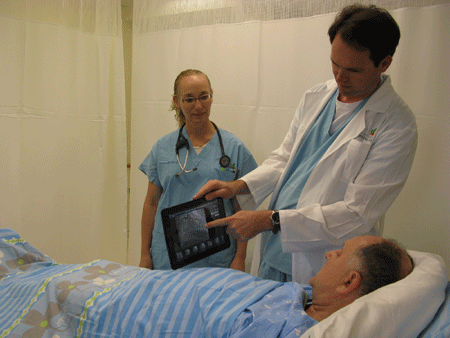 Though the iPad has been tremendously popular among physicians since it first appeared in 2010, Apple's iconic tablet might not be all that useful for clinical documentation or for medical education, a newly published survey of residents found. Surgical residents in particular rated the iPad very low for educational utility and as a resource for evidence-based medicine, according to the study, published in the Journal of Mobile Technology in Medicine.
Though the iPad has been tremendously popular among physicians since it first appeared in 2010, Apple's iconic tablet might not be all that useful for clinical documentation or for medical education, a newly published survey of residents found. Surgical residents in particular rated the iPad very low for educational utility and as a resource for evidence-based medicine, according to the study, published in the Journal of Mobile Technology in Medicine.
"We found that residents across all disciplines did not perceive the iPad to be clinically useful on daily work rounds, and had only slightly increased value as an educational tool," read the report, based on research conducted at Riverside Methodist Hospital, an OhioHealth facility in Columbus, Ohio.
"Additionally significant differences existed between medical and surgical residents' perceived value of the iPad’s utility. Institutions should consider these differences and address connectivity and support issues before implementing iPad programs across all disciplines," the study said. This appears to contradict conventional wisdom, which has held that iPads are well-suited for hospital rounds, despite apparent shortcomings for other medical tasks.
The hospital issued 16-gigabyte iPad 2 tablets (WiFi-only) to all 119 residents for the 2011-12 school year, and each resident also received a $100 stipend for accessories. They also were given lab coats with oversized pockets to hold the iPads.
Residents were told to use their iPads "as they saw fit" both inside and outside the hospital, according to the study. A total of 102 took an online survey about the iPad at the end of the school year, scoring each question on a five-point Likert scale (1 = never, 2 = rarely, 3 = sometimes, 4 = often and 5 = always).
Just 18.1 percent of medical residents and 6.7 percent of surgical or OB/GYN residents said they often or always used their iPads on rounds. Only slightly more reported that they usually consulted their tablets between rounds to review lab results, progress notes, images and other patient information. (The researchers counted OB/GYN residents as having a surgical focus.)
The researchers, led by Dr. Matthew Skomorowski of the hospital's Department of Medical Education, partially attributed this to the fact that accessing the electronic health record on an iPad required an inconvenient two-step login. During the study period, Riverside Methodist did have an EHR, though orders were still handwritten. "Consequently, workflow on the iPad was disjointed; residents were unable to do everything in one place (view results, place orders and/or document) which may have negatively affected efficiency and perception when using the iPad on daily rounds," the report noted.
An even lower number of surgical residents, 3.3 percent, said that using the iPad in the hospital increased their efficiency in writing progress notes. Among medical residents, 9.7 percent said the iPad made them more efficient with notes. Satisfaction was higher when looking up patient results, reports and other information to practice evidence-based medicine, with about a third of medical residents and a sixth of their surgical colleagues concurring.
There was a huge gulf in the opinions of medical residents and surgical residents in terms of the iPad being a "valuable educational tool" during rounds. Merely 6.7 percent of the latter group thought so, compared to 41.7 percent of the former.
"Though not addressed by this study, disparity may exist due to differences in clinical rounding styles as well as the working life of medical vs. procedural-based residents with different emphasis on data use and interpretation," the researchers wrote.
Overall, about 40 percent of respondents indicated the iPad facilitated better patient care, though medical residents were twice as likely as surgical residents to say so.
The iPad fared significantly better as a reference tool. Nearly 58 percent of all 102 residents surveyed, including 63.3 percent of those in surgical or obstetric specialties, said they used their iPads outside the hospital to read articles and other research. Residents most often recommended Epocrates and Micromedex medication reference apps, as well as EBM tools from Medscape and UpToDate, to their colleagues, the study said.
















